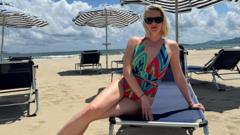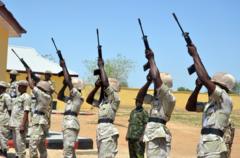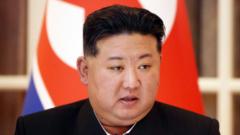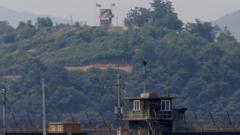**Anastasia Samsonova's recent trip reveals the challenges and peculiarities of this unique destination where luxury meets secrecy.**
**Exploring North Korea's Exclusive Coastal Resort: A Journey to Wonsan Kalma**

**Exploring North Korea's Exclusive Coastal Resort: A Journey to Wonsan Kalma**
**Tourism in North Korea awakens as Russian visitors flock to newly opened beach haven amidst strict regulations.**
In July this year, a fresh chapter in North Korean tourism unfolded as Wonsan Kalma Coastal Tourist Zone opened its doors, welcoming a select group of visitors. This exclusive resort, whispering luxury amidst strict regulations, is located on the east coast of North Korea—an area steeped in historical significance for the country's leader, Kim Jong Un. Among the first to experience this new offering was 33-year-old Anastasia Samsonova, a human resources worker traveling with a tightly monitored group of Russian tourists.
The resort, featuring plush hotels, restaurants, shopping venues, and an expansive water park, faced a curious distinction as it only permitted visitors from Russia, a strategic ally. While the site initially seemed poised to welcome a broader international audience, ongoing restrictions, exacerbated by the global pandemic, saw the North Korean authorities prioritize cultural insulation over open tourism.
Anastasia’s visit was marked by a regimen of guards and guides, who not only shaped the itinerary but also restricted interactions with local North Koreans. "They warned us to avoid startling the locals," said Anastasia, explaining how the residents observed them with a mix of curiosity and surprise, a testament to the prolonged isolation of the country.
Despite the stringent protocols, Anastasia found solace in the serene ambiance of near-empty beaches, maintained to perfection. "The cleanliness was exceptional, the loungers pristine, and the gentle entrance to the sea made it an idyllic spot," she remarked, describing her unexpected enjoyment of the tranquil escape.
A week's vacation at the resort, costing $1,800—a steep price considering the local economic standards—offered its guests a flavor of North Korean cuisine alongside unique souvenirs, even including toy rocket replicas reflecting the nearby missile testing site. Anastasia noted that while the accommodations were far from the all-inclusive extravagance typical of tropical holidays, the experience bore an exotic charm not often found elsewhere.
However, her group was quick to note the undercurrents of unrest surrounding the establishment of Wonsan Kalma. Observations from human rights organizations highlighted the concerning treatment of laborers involved in constructing this high-profile project, drawing attention to allegations of exploitation and harsh working conditions.
There remains unanswered speculation about the future of tourism at this exclusive resort, particularly with fluctuating policy from North Korean officials. Travel agencies have been promising new tours to Russian groups, yet anticipation remains mingled with uncertainty.
As Anastasia reflects on her trip, there lies a glimmer of hope to revisit next year. A desire to explore a nearby ski resort echoes the adventurous spirit many seek in these uncharted territories. Her journey to Wonsan Kalma encapsulates the intersection of curiosity for the unknown and the guarded nature of a country that remains both fascinating and elusive.
The resort, featuring plush hotels, restaurants, shopping venues, and an expansive water park, faced a curious distinction as it only permitted visitors from Russia, a strategic ally. While the site initially seemed poised to welcome a broader international audience, ongoing restrictions, exacerbated by the global pandemic, saw the North Korean authorities prioritize cultural insulation over open tourism.
Anastasia’s visit was marked by a regimen of guards and guides, who not only shaped the itinerary but also restricted interactions with local North Koreans. "They warned us to avoid startling the locals," said Anastasia, explaining how the residents observed them with a mix of curiosity and surprise, a testament to the prolonged isolation of the country.
Despite the stringent protocols, Anastasia found solace in the serene ambiance of near-empty beaches, maintained to perfection. "The cleanliness was exceptional, the loungers pristine, and the gentle entrance to the sea made it an idyllic spot," she remarked, describing her unexpected enjoyment of the tranquil escape.
A week's vacation at the resort, costing $1,800—a steep price considering the local economic standards—offered its guests a flavor of North Korean cuisine alongside unique souvenirs, even including toy rocket replicas reflecting the nearby missile testing site. Anastasia noted that while the accommodations were far from the all-inclusive extravagance typical of tropical holidays, the experience bore an exotic charm not often found elsewhere.
However, her group was quick to note the undercurrents of unrest surrounding the establishment of Wonsan Kalma. Observations from human rights organizations highlighted the concerning treatment of laborers involved in constructing this high-profile project, drawing attention to allegations of exploitation and harsh working conditions.
There remains unanswered speculation about the future of tourism at this exclusive resort, particularly with fluctuating policy from North Korean officials. Travel agencies have been promising new tours to Russian groups, yet anticipation remains mingled with uncertainty.
As Anastasia reflects on her trip, there lies a glimmer of hope to revisit next year. A desire to explore a nearby ski resort echoes the adventurous spirit many seek in these uncharted territories. Her journey to Wonsan Kalma encapsulates the intersection of curiosity for the unknown and the guarded nature of a country that remains both fascinating and elusive.
















